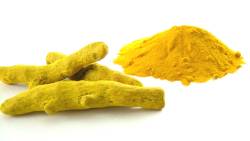|
Turmeric Benefits
Health Benefits of Turmeric
This pages focuses on turmeric benefits - What is turmeric? What are the benefits of turmeric? Are there any side effects of turmeric? Read on
and find out.
What is Turmeric?
 If you like curry, you will no doubt know about turmeric. It is the spice that gives curry the yellow color.
However, turmeric is not just a simple spice. It has a lot of medicinal properties and holistic practitioners are paying increasing attention to this herb.
Turmeric is made from the rhizomes (underground roots) of Curcuma longa, a beautiful tropical leafy plant of the ginger family, Zingiberaceae. The plant has
yellow or yellowish-white flowers.
The roots are harvested at the end of the growing season, sun dried, and crushed to make ground turmeric.
If you like curry, you will no doubt know about turmeric. It is the spice that gives curry the yellow color.
However, turmeric is not just a simple spice. It has a lot of medicinal properties and holistic practitioners are paying increasing attention to this herb.
Turmeric is made from the rhizomes (underground roots) of Curcuma longa, a beautiful tropical leafy plant of the ginger family, Zingiberaceae. The plant has
yellow or yellowish-white flowers.
The roots are harvested at the end of the growing season, sun dried, and crushed to make ground turmeric.
Turmeric Benefits
Turmeric is rich in curcumin, the natural pigment that gives turmeric its yellow color. It has been found that curcumin is a powerful antioxidant. It has
anti-carcinogenic, anti-parasitic, anti-microbial and anti-inflammatory properties.
Turmeric is also rich in vitamins C and E, along with several carotenoids - all of which are antioxidants as well.
Because of its anti-inflammatory and antioxidant properties, turmeric is effective in blocking inflammation, especially inflammation caused by arthritis and
gout. Its effectiveness in relieving pain and stopping inflammation is comparable to,
if not exceeding, that of aspirins and corticosteroid medications. In addition, turmeric does not have the side effects caused by aspirins (e.g. stomach irritation, gastric
ulcers) and corticosteroids (e.g. fluid retention, high blood pressure, and bone damage).
Top
Turmeric Health Benefits
Turmeric benefits are numerous although many people only use turmeric for its anti-inflammatory and pain-relief properties. Certainly, people suffering from arthritis or
gout or other pain-causing inflammatory diseases can benefit from turmeric. However, turmeric benefits do not stop there. Other turmeric health benefits include:

- Cancer Prevention: There is good evidence to suggest that turmeric helps prevent colon, breast, and lung cancers as well as melanomas. It works
by interfering with cancer in different ways. For example, curcumin seems to be able to neutralize some cancer-causing substances. It can also stop very early changes in
cells that can turn to cancer. If cancer cells have already formed, curcumin appears to be able to reduce the number and size of the tumors. It also prevents the cancer
from metastasizing (spreading).
- Heart Disease: Turmeric benefits people prone to heart disease. The antioxidant properties of curcumin help prevent cholesterol from causing the
narrowing of the arteries, called atherosclerosis. In addition, several studies have
reported that curcumin is beneficial in lowering the level of bad cholesterol while raising good cholesterol.
- Digestive Complaints: Curcumin helps increase the mucous content in gastric juices, which can make it helpful for stomach disorders. Also,
curcumin protects the stomach from tainted foods by killing salmonella bacteria and protozoa that can cause diarrhea. A diet rich in turmeric reduces the chance of
inflammatory bowel disease.
- Liver Problems: Being a natural detoxifier, turmeric protects the liver from the damaging effects of alcohol and certain toxins and chemicals. It
stimulates bile production which helps digest fat and fight obesity.
- Certain Skin Problems: Turmeric benefits people with certain skin problems such as
athlete's foot because of its antifungal properties. Also, turmeric benefits people with
bunions because of its anti-inflammatory properties. It helps reduce the swelling that makes bunions so painful.
Top
Turmeric Health Benefits - Dosage
Unless you really like curry, the easiest way to get turmeric benefits is by taking the main active ingredient, curcumin, in supplements.
Recommended dosage is 400 mg three times daily.
For topical use on athlete's foot, you can use the oil of turmeric. Dilute one part of the oil to two parts of water and use a cotton ball to apply it directly to the
affected area.
To relieve the pain of bunions, use a poultice topically - apply a teaspoon of fresh, grated turmeric to the bunion twice a day.
Top
Side Effects of Turmeric
Moderate consumption of turmeric is safe and usually does not cause any side effects.
There is some evidence that consuming too much turmeric may cause stomach irritation in some people, such as stomach upset and other gastrointestinal problems like diarrhea
or constipation.
Eating very large amounts of turmeric could potentially damage white and red blood cells. If you have a blood-clotting disorder, it may be a good idea to consult your doctor
before taking this herb just to be on the safe side.
Women who are pregnant or nursing can eat turmeric (curried) food with no problem, but supplement use has yet to be researched thoroughly.
References
Duke, J.A., Dr. Duke's Essential Herbs, (Rodale Books, 2000).
Power-of-Turmeric.com.
TOP of Turmeric Benefits
|
| Top 10 Most Visited Pages |
|---|
|

